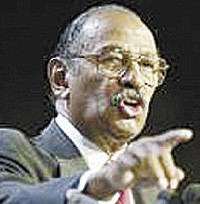If the turnout and response at Steve Cohen‘s “town meeting” with Michigan congressman John Conyers last Thursday night at the National Civil Rights Museum was any indication of the 9th District congressman’s future fortunes, Cohen might as well start looking into long-term living arrangements in the District of Columbia.
Conyers isn’t your ordinary visiting congressman, for starters. The longtime representative from Detroit is chairman of the House Judiciary Committee, on which freshman Cohen sits. Not only that, he was on Judiciary in 1974 when the committee voted articles of impeachment against Richard Nixon, hastening that errant president’s departure from office. And not only that, as Conyers reminded this reporter afterwards, he wrote the first articles of impeachment against Nixon.
In short, the man is a congressional legend, and Conyers’ very presence here was a tribute to Cohen’s standing this early in his congressional tenure. Beyond that, Conyers made a point of extending his explicit blessing to Cohen, and since the noted Michigander takes a back seat to no one on economics and civil rights issues, it was a convincing plug for Cohen to the African Americans in the audience (who were numerous and enthusiastic and who conferred frequent praise on both congressmen).
The congressmen fielded an abundance of questions and concurred on such matters as impeachment of President Bush (justifiable but not practical with other priorities facing the nation), health care (a scandal and a scam as proposed by Bush), Iraq (should be ended now by cutting off funds), Iran (containable without potentially reckless military adventurism by Bush), civil liberties (severely menaced at present), getting out the vote (election procedures need amending and rights need to be safeguarded), and much more.
Conyers and Cohen dilated, when asked, on everything from inadequate traffic lights at Third and Holmes to the continuing shameful conditions in New Orleans after Katrina. They spoke without hesitation and with no roundabout dodges. People were still lined up to ask questions when Cohen aide Willie Henry was forced to call time, advising the crowd (which filled up both the museum’s auditorium and an overflow room with a TV monitor) that written questions could be submitted with assurances they would be answered later, presumably by mail.
The crowd, mixed with equal parts Everyman and Who’s Who types, seemed satisfied. So did the two congressmen. Cohen, whose verbal nimbleness was on a par with that of his illustrious guest, will no doubt make a habit of these affairs. He would be well advised to.
Or so thought such attendees as maverick blogger Thaddeus Matthews, who boldly proclaimed afterward: “This is the first time in decades this district has gotten straight answers.”
A generous sampling of those “straight answers” can be found under the head “Cohen, Conyers Click Together at Town Meeting” in “Political Beat” at MemphisFlyer.com. Here are two brief samples:
Conyers on Katrina: “[It’s] one of the greatest scandals of this administration. There’s some $9 million missing … . There’s nothing to come back to in New Orleans. Government negligence has been more harmful than the natural disaster.”
Cohen on Iraq: “This is Bush’s war. It’s like Rosemary’s baby. It’s named … My hands are not tainted by a vote for this war, and I don’t intend to get my hands tainted.”
More Cohen: Consistent with predictions by some (read: this columnist) that Cohen would equal or excel the celebrity quotient of his 9th District predecessor, Harold Ford Jr., the hyperactive congressman was due to appear this Thursday night as the featured guest on The Colbert Report with Stephen Colbert. Steve to Steve, as it were.
And, as it happens, the Memphis congressman was the only major local official to lend his office to active pursuit of a Toyota plant for nearby Marion, Arkansas. Mayors Willie Herenton and A C Wharton offered little encouragement beyond lip service, if that — seemingly in deference to efforts by Governor Phil Bredesen and other state officials to attract the plant to Chattanooga.
In the event, Toyota announced Tuesday morning that the plant would be built in Tupelo, Mississippi, instead — inconveniently distant from the Memphis labor market and off the Tennessee tax rolls, as well.
• As Shelby County Democrats head into this month’s reorganization meetings — a preliminary caucus on Saturday, followed by a convention on March 31st — there is no clear favorite for party chairman, with lawyer Jay Bailey still the only fully declared candidate.
Others reportedly considering a bid are Jody Patterson, Desi Franklin, and Shelby County commissioner Henri Brooks. A brief draft boomlet on the part of several activists for interim state senator Shea Flinn collapsed last week when Flinn expressed no interest.
A key to the process may be county commissioner Sidney Chism, leader of one of the party’s three major factions, who said last week he would not support Bailey but has not specified his own preference.
Meanwhile, county Republicans made little fuss in reelecting their own chairman, Bill Giannini, at a convention over the weekend.
